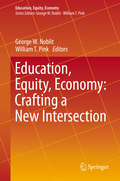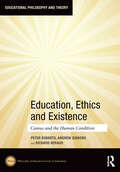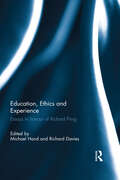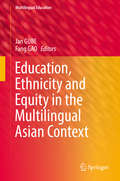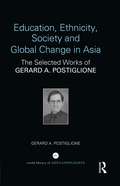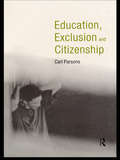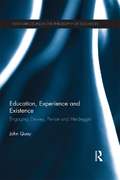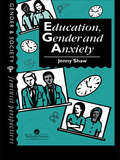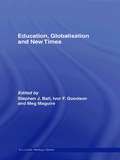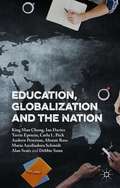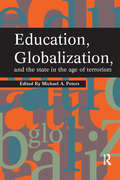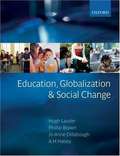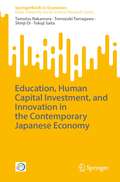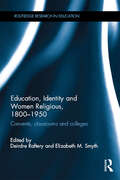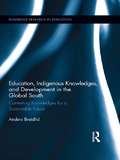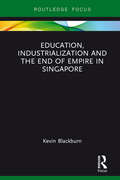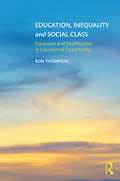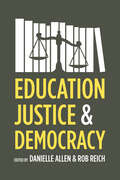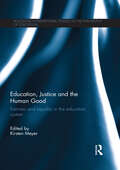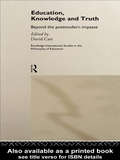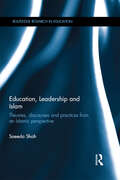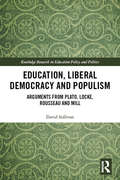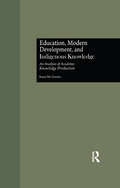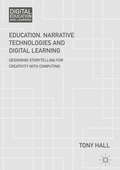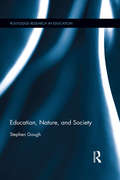- Table View
- List View
Education, Equity, Economy: Crafting a New Intersection
by George W. Noblit William T. PinkThis volume will introduce the readers to an alternative nexus of education, equity and economy, pointing to economies and educations that promote a less stratified and exploitive world, and as the chapter authors demonstrate, this view has a wide range of applications, from technology, mathematics, to environmental catastrophes and indigenous cultures. This first volume in the new book series not only introduces the series itself, but also several authors whose chapters that appear here presage the in-depth analysis that will be offered by their volumes in the series. Education is invoked repeatedly in the 'class warfare' that pits the population against the elites as the investment that makes the difference, in terms of both policy and individual commitment, in the economy. The economy in this scenario is competitive, accumulative, exploitive and stratifying, implying education should mirror this and prepare people to fit this economy. However, education has other historic goals of developing common cultures, national identities, and civic engagement that belie this form of economic determinism. This volume and the series will explore this new nexus of economy and education with equity.
Education, Ethics and Existence: Camus and the Human Condition (ISSN)
by Peter Roberts Andrew Gibbons Richard HeraudBest known today for his novels, plays and short stories, but also an accomplished essayist, editor and journalist, Albert Camus was one of the most influential literary figures of the 20th century. He has gained widespread recognition for works such as The Stranger, Caligula, The Plague and Exile and the Kingdom. In 1957 Camus was awarded the Nobel Prize for Literature. In 1960 he was killed in a car accident, aged just 46. Since Camus’ untimely death, his work has been engaged by scholars in literature, politics, philosophy and many other fields. This volume is one of the first book-length studies of Camus with a specifically educational focus. Camus’ writings raise and address ethical and political questions that resonate strongly with current concerns and debates in educational theory, and the difficulties and dilemmas faced by his characters mirror those encountered by many teachers in school classrooms. This book will appeal to all who wish to consider the connections between education, ethics and the problem of human existence.This book was originally published as a special issue of Educational Philosophy & Theory.
Education, Ethics and Experience: Essays in honour of Richard Pring
by Richard Davies Michael HandEducation, Ethics and Experience is a collection of original philosophical essays celebrating the work of one of the most influential philosophers of education of the last 40 years. Richard Pring’s substantial body of work has addressed topics ranging from curriculum integration to the comprehensive ideal, vocational education to faith schools, professional development to the privatisation of education, moral seriousness to the nature of educational research. The twelve essays collected here explore and build on Pring’s treatment of topics that are central to the field of philosophy of education and high on the agenda of education policy-makers. The essays are by no means uncritical: some authors disagree sharply with Pring; others see his arguments as useful but incomplete, in need of addition or amendment. But all acknowledge their intellectual debt to him and recognise him as a giant on whose shoulders they stand. This book will be a welcome and lively read for educational academics, researchers and students of Educational Studies and Philosophy.
Education, Ethnicity and Equity in the Multilingual Asian Context (Multilingual Education #32)
by Jan Gube Fang GaoThe book addresses issues related to the education of ethnic minority individuals in the multilingual Asian region. It features recent research and practices of scholars aiming to rethink educational policy and practice surrounding the education of ethnic minority students with a variety of language scenarios in Hong Kong and other Asian contexts. It documents how ethnicity and inequality are played out at policy, school, and individual levels, and how these affect the education of ethnic minorities in their host societies. Using a range of methods, from surveys to interviews and document analysis, this book describes the links between language, identity and educational inequality related to ethnic minorities in Asian contexts.
Education, Ethnicity, Society and Global Change in Asia: The Selected Works of Gerard A. Postiglione
by Gerard A. PostiglioneIn the World Library of Educationalists series, international experts compile career-long collections of what they judge to be their finest pieces – extracts from books, key articles, salient research findings, major theoretical and practical contributions – so the world can read them in a single manageable volume. Readers will be able to follow the themes and strands and see how their work contributes to the development of the field. For more than three decades, Gerard A. Postiglione has witnessed first-hand the globalization of education and society in Hong Kong, China and the wider Asian region. He is a pioneer among Western scholars in the field and his fluency in Chinese has resulted in innovative primary research and fieldwork. He has brought sociological, policy, and comparative perspectives to important educational issues in Asia. His research emphasizes the diversity and complexity of the region, from studies of education and the academic profession during Hong Kong’s retrocession, to reform of ethnic minority education and the rise of world class universities in the Chinese mainland, as well as the complexity of mass higher education in an increasingly dynamic Asia. He is one of the researchers most sought-after by international organizations concerned with educational reform in Asia and by major media outlets to inform the public on issues of globalization and higher education. Gerard was honoured by the Comparative and International Education Society with a Lifetime Contribution Award and Best Book Award for his contribution to the field. In 2016 he was inducted as a Fellow of the American Educational Research Association. This selection of 12 of his most representative papers and chapters documents his scholarship in comparative higher education in Asia.
Education, Exclusion and Citizenship: A Study Of Fleet Road Board School, Hampstead
by Carl ParsonsEducation, Exclusion and Citizenship provides a hard-hitting account of the realities of exclusion, examining the behaviour which typically results in exclusion, and asks questions about a society which communally neglects those most in need. Permanent exclusions from schools continue to rise. As schools compete with neighbouring schools for 'good' pupils, managers and heads are choosing to exclude disruptive pupils who might affect school image.The book looks at the experience of excluded children, the law regulating exclusion, the obligations of the LEAs, and focuses on prevention and early intervention strategies.
Education, Experience and Existence: Engaging Dewey, Peirce and Heidegger (New Directions in the Philosophy of Education)
by John QuayEducation, Experience and Existence proposes a new way of understanding education that delves beneath the conflict, confusion and compromise that characterize its long history. At the heart of this new understanding is what John Dewey strove to expound: a coherent theory of experience. Dewey’s reputation as a pragmatist is well known, but where experience is concerned pragmatism is only half the story. The other half is phenomenological, as crafted by Martin Heidegger. Encompassing both is Charles Sanders Peirce, whose philosophy draws pragmatism and phenomenology together in an embrace which enables a truly experiential philosophy to emerge. The book approaches the problem of confusion in education and philosophy by beginning with our most basic understandings of existence. Existence as an interaction is the starting point of modern science, and existence as individuality offers an aesthetic origin, attending to existence as a simple unity. In our contemporary world where scientific ways of thinking are privileged, the aesthetic whole is often overlooked, especially in education. Yet both are connected. A coherent theory of experience is therefore a marriage between phenomenology and pragmatism, enabling each to maintain its position by acknowledging how both are required. The book is divided into three main parts: - confusion in philosophy and education- a coherent theory of experience- a coherent theory of education. Quay suggests that education benefits from such a coherent theory of experience by better comprehending its connection to life. More than just knowing, more than just doing, education is about being. This book will be of interest to philosophers, educators and educational philosophers.
Education, Gender And Anxiety (Gender And Society Ser.)
by Jenny ShawThis interdisciplinary text explores the scope for applying psychoanalytical ideas to gender inequalities that are inherent in the educational system. Although modern education aims to egalitarian and meritocratic, it is still true that in most cases it does not improve the life chances of girls to the extent that it ought to, or does for boys. Based on literature gathered from North America, Europe and Britain, this text argues for an 'object relations' approach when analysing gender differences in subject choice and polarisation in reading, writing and drawing, and stresses the need to pay close attention to the unconscious processes which school settings mobilise. Analysing the concept of 'in Loco Parentis', it presents parenting as the emotional substructure of education, and suggests challenging areas for future empirical work.
Education, Globalisation and New Times: 21 Years of the Journal of Education Policy (Education Heritage)
by Meg Maguire Stephen J. Ball Ivor F. GoodsonEducation, Globalisation and New Times comprises a selection of the most influential papers published over the twenty-one years of the Journal of Education Policy. Written by many of the leading scholars in the field, these seminal papers cover a variety of subjects, sectors and levels of education, focused around the following major themes: education, globalisation and new times policy theory and method policy and equity. Compiled by the journal's editors, Stephen Ball, Ivor Goodson and Meg Maguire, the book illustrates the development of the field of education policy studies, and the specially written Introduction contextualises the selection, whilst introducing students to the main issues and current thinking in the field.
Education, Globalization and the Nation: Dilemmas And Directions For Civics And Citizenship Education (Routledge Research in Education)
by Andrew Peterson Alistair Ross Ian Davies Terrie Epstein Alan Sears Debbie Sonu Carla Peck Maria SchmidtAndy Green develops on his earlier historical work on Education and State Formation in a study of education and the nation state in an era of globalization. Education, Globalization and the Nation State offers the first sustained analysis of the implications of globalization for modern education systems. In a series of historical and comparative essays ranging from Europe to America and Asia, Green assesses the changing relations between education and the nation state in different regions, and concludes that the national education system is far from obsolete.
Education, Globalization and the State in the Age of Terrorism
by Michael A. PetersEducation plays an important role in challenging, combating and in understanding terrorism in its different forms, whether as counter-terrorism or as a form of human rights education. Just as education has played a significant role in the process of nation-building, so education also plays a strong role in the process of empire, globalization and resistance to global forces-and in terrorism, especially where it is linked to emergent statehood. This book focuses on the theme of education in an age of terrorism, exploring the conflicts of globalization and global citizenship, feminism post-9/11, youth identities, citizenship and democracy in a culture of permanent war, and the relation between education and war, with a focus on the war against Iraq.
Education, Globilization and Social Change
by Phillip Brown Hugh Lauder Jo-Anne Dillabough A. H. HalseyEducation is seen as central to economic competitiveness, the reduction of poverty and inequality, and environmental sustainability. This book is an invaluable collection of key readings, with particular reference to globalization, for anyone concerned with the study of education at a time of major economic and social change.
Education, Human Capital Investment, and Innovation in the Contemporary Japanese Economy (SpringerBriefs in Economics)
by Tamotsu Nakamura Tomoyuki Tamagawa Shinji Oi Tokuji SaitaThis book analyzes education in Japan from the viewpoint of “the stagnant current Japanese economy”. Tomoyuki Tamagawa, a long-time mathematics teacher in junior high school, is now a vice principal. He and Tamotsu Nakamura have written Chapter 1 of this book together because they believe that the loss of vitality in the Japanese economy is due to the problem of human capital formation in school education. Shinji Oi has worked for many years at a Japanese broadcasting station and has extensive experience in human resource development. In Chapter 2, he analyzes the relationship between optimal human capital investment and labor market mobility, based on his recognition of the importance of vocational training, or human capital investment at the firm and the necessity for good allocation of human resources. Tokuji Saita is well versed not only in the realities and practices in the financial industry but also in the financial system as a whole. In Chapter 3, based on his long experience in the financial industry, he analyzes and points out the importance of “openness” of innovation from a macroeconomic point of view.
Education, Identity and Women Religious, 1800-1950: Convents, classrooms and colleges (Routledge Research in Education)
by Deirdre Raftery and Elizabeth M. SmythThis book brings together the work of eleven leading international scholars to map the contribution of teaching Sisters, who provided schooling to hundreds of thousands of children, globally, from 1800 to 1950. The volume represents research that draws on several theoretical approaches and methodologies. It engages with feminist discourses, social history, oral history, visual culture, post-colonial studies and the concept of transnationalism, to provide new insights into the work of Sisters in education.Making a unique contribution to the field, chapters offer an interrogation of historical sources as well as fresh interpretations of findings, challenging assumptions. Compelling narratives from the USA, Canada, New Zealand, Africa, Australia, South East Asia, France, the UK, Italy and Ireland contribute to what is a most important exploration of the contribution of the women religious by mapping and contextualizing their work. Education, Identity and Women Religious, 1800–1950: Convents, classrooms and colleges will appeal to academics, researchers and postgraduate students in the fields of social history, women’s history, the history of education, Catholic education, gender studies and international education.
Education, Indigenous Knowledges, and Development in the Global South: Contesting Knowledges for a Sustainable Future (Routledge Research in Education)
by Anders BreidlidThe book's focus is the hegemonic role of so-called modernist, Western epistemology that spread in the wake of colonialism and the capitalist economic system, and its exclusion and othering of other epistemologies. Through a series of case studies the book discusses how the domination of Western epistemology has had a major impact on the epistemological foundation of the education systems across the globe. The book queries the sustainability of hegemonic epistemology both in the classrooms in the global South as well as in the face of the imminent ecological challenges of our common earth, and discusses whether indigenous knowledge systems would better serve the pupils in the global South and help promote sustainable development.
Education, Industrialization and the End of Empire in Singapore (Routledge Studies in Educational History and Development in Asia)
by Kevin BlackburnSingapore under the ruling People’s Action Party government has been categorized as a developmental state which has utilized education as an instrument of its economic policies and nation-building agenda. However, contrary to accepted assumptions, the use of education by the state to promote economic growth did not begin with the coming to power of the People’s Action Party in 1959. In Singapore, the colonial state had been using education to meet the demands of its colonial economy well before the rise of the post-independence developmental state. Education, Industrialization and the End of Empire in Singapore examines how the state’s use of education as an instrument of economic policy had its origins in the colonial economy and intensified during the process of decolonization. By covering this process the history of vocational and technical education and its relationship with the economy is traced from the colonial era through to decolonization and into the early postcolonial period.
Education, Inequality and Social Class: Expansion and Stratification in Educational Opportunity
by Ron ThompsonEducation, Inequality and Social Class provides a comprehensive discussion of the empirical evidence for persistent inequality in educational attainment. It explores the most important theoretical perspectives that have been developed to understand class-based inequality and frame further research. With clear explanations of essential concepts, this book draws on empirical data from the UK and other countries to illustrate the nature and scale of inequalities according to social background, discussing the interactions of class-based inequalities with those according to race and gender. The book relates aspects of inequality to the features of educational systems, showing how policy choices impact on the life chances of children from different class backgrounds. The relationship between education and social mobility is also explored, using the concepts of social closure, positionality and social congestion. The book also provides detailed discussions of the work of Pierre Bourdieu and Basil Bernstein, two important theorists whose contributions have generated thriving research traditions much used in contemporary educational research. Education, Inequality and Social Class will be essential reading for postgraduate and advanced undergraduate students engaged in the study of education, childhood studies and sociology. It will also be of great interest to academics, researchers and teachers in training.
Education, Justice & Democracy
by Danielle Allen and Rob ReichEducation is a contested topic, and not just politically. For years scholars have approached it from two different points of view: one empirical, focused on explanations for student and school success and failure, and the other philosophical, focused on education’s value and purpose within the larger society. Rarely have these separate approaches been brought into the same conversation. Education, Justice, and Democracy does just that, offering an intensive discussion by highly respected scholars across empirical and philosophical disciplines. The contributors explore how the institutions and practices of education can support democracy, by creating the conditions for equal citizenship and egalitarian empowerment, and how they can advance justice, by securing social mobility and cultivating the talents and interests of every individual. Then the authors evaluate constraints on achieving the goals of democracy and justice in the educational arena and identify strategies that we can employ to work through or around those constraints. More than a thorough compendium on a timely and contested topic, Education, Justice, and Democracy exhibits an entirely new, more deeply composed way of thinking about education as a whole and its importance to a good society.
Education, Justice and the Human Good: Fairness and equality in the education system (Routledge International Studies in the Philosophy of Education)
by Kirsten MeyerThe education system is faced with many demands of justice. What these demands imply and how they are justified is, however, disputed. In this book, international contributors present cutting edge research to discuss the relationship between educational justice and the value of education.By combining reflections on educational justice with reflections on the human good and the aims of education, the book reveals that it is not enough to assess certain patterns of distribution; the value of what is to be distributed must also be clarified. In this respect, deliberations about the value of education have to play an integral part in giving an account of educational justice. Questions addressed in the volume include: - In what sense should justice, fairness and equality be realised in the education system? - How is educational equality related to equality of opportunity? - Is the main concern that everyone should be educated equally well – or just well enough?Education, Justice and the Human Good discusses the positional value of education and its relation to educational justice, emphasising that education is valuable not only for competitive reasons, but in its contribution to human flourishing. The book will appeal to those from the field of the philosophy of education as well as applied political philosophy, from undergraduates to professional academics.
Education, Knowledge and Truth: Beyond the Postmodern Impasse (Routledge International Studies in the Philosophy of Education)
by David CarrThis collection aims to explore different conceptions of epistemological inquiry and their influence on pedagogy and the curricular content of primary and secondary education. It is arguable that curriculum policy makers have continued to subscribe to a foundationalist paradigm of rational educational planning. This is, however, considered largely untenable by educational philosophers in light of the impact of 'postmodern' philsophical critiques on the notions of objectivity, truth and authority in our claims for knowledge. This volume fills a major gap in the current literature of educational philosophy by calling for the establishment of a coherent route between rational foundationalism and intellectually promiscuous postmodernism in order to address the point and purpose of contemporary education.
Education, Leadership and Islam: Theories, discourses and practices from an Islamic perspective (Routledge Research in Education)
by Saeeda ShahEducational institutions are undergoing complex and sensitive changes in the context of immigration, international mobility, globalisation, and shifting economic scenarios, making highly challenging demands on educational leaders. Leadership is increasingly being perceived and theorised as pivotal to students’ achievement and institutional performance. In this book, Saeeda Shah considers educational leadership from an Islamic perspective to debate theoretical positions underpinned by Islamic texts and teachings, and the resulting conceptualisations and interpretations. While educational leadership literature and research have flourished in recent years, this is predominantly informed by Western ideologies, concepts, theories and practices. Education, Leadership and Islam focuses on contemporary educational settings and practices, drawing on research and empirical evidence from multicultural contexts in order to enrich theory and inform policy and practice in relevant frameworks, particularly in relation to the growing Muslim population in the West. Chapters also discuss gender in Islam, educational expectations and Islamic faith schools to comprehensively explore education in relation to Islamism. Situating Muslims within contemporary societies, this book extends debates regarding educational philosophy and leadership, endorsing diversity and plurality through an appreciation of difference. Education, Leadership and Islam will appeal to education researchers as well as social and political scientists attempting to understand Muslim educational issues in contemporary life, both in the east and in the west. This book offers critical insight into educational theory and practice, and as such will be key reading for policy makers and educational leaders.
Education, Liberal Democracy and Populism: Arguments from Plato, Locke, Rousseau and Mill (Routledge Research in Education Policy and Politics)
by David SullivanEducation, Liberal Democracy and Populism: Arguments from Plato, Locke, Rousseau and Mill provides a lucid and critical guide shedding light on the continuing relevance of earlier thinkers to the debates between populists and liberals about the nature of education in democratic societies. The book discusses the relationship Rousseau and Plato posited between education and society, and contrasts their work with the development of liberal thinking about education from John Locke, and John Stuart Mill’s arguments for the importance of education to representative democracy. It explores some of the roots of populism and offer a broader perspective from which to assess the questions which populists pose and the answers which liberals offer. The book makes a substantial contribution to the current debate about democracy, by emphasising the central importance of education to political thought and practice, and suggests that only an education system based on liberal democratic principles can offer the possibility of a genuinely free society. This book is ideal reading for researchers and post-graduate students in education, politics, philosophy and history. It will also be of great interest to Educational practitioners and policy makers.
Education, Modern Development, and Indigenous Knowledge: An Analysis of Academic Knowledge Production (Indigenous Knowledge and Schooling #1)
by Seana McGovernThis book re-conceptualizes the field of international and comparative education by utilizing indigenous knowledge as a central component for altering the dominant, eurocentric social science research paradigm. Examples from indigenous sources of knowledge are juxtaposed to the dominant discourses on education and modern development in subaltern societies in order to provide scholars with alternative ways of viewing education and development and to shape how subaltern peoples are understood and represented in academic research. Bibliography. Index.
Education, Narrative Technologies and Digital Learning: Designing Storytelling for Creativity with Computing (Digital Education and Learning)
by Tony HallThis book examines and illustrates the potential of narrative technology, the integration and synthesis of storytelling and digital media in education. Storytelling is a foundational and powerful process in all learning and teaching, and technology is becoming ever more ubiquitous and sophisticated, particularly in its capabilities to mediate and augment creative storytelling. The book begins with a foundational analysis of narrative use in education today, and provides a history of the emergence of narrative technology. It explores how the convergence of high-potential computing and storytelling practices and techniques can be used to enhance education, in particular the design of bespoke, interactive physical learning environments. The contemporary importance of educational design is highlighted throughout the book, which concludes with the SCÉAL design-based research framework as a proposed systematic approach to the design of narrative technology in education. The book will be a valuable resource for educational designers, technologists, teachers and policymakers, especially those with an interest in the design and use of narrative technology in education.
Education, Nature, and Society (Routledge Research in Education)
by Stephen GoughEnvironmental issues continue to divide opinion, sometimes in extreme ways. Almost everyone agrees that education has a role to play in ensuring the future of humanity on Earth. Some think we should all learn to leave a minimal environmental footprint; others argue that education should promote economic growth, because only growth can generate the capital needed to develop solutions to environmental problems. Advocates on each side often find the views of their opponents simply incredible, giving rise to accusations of bad faith or poor science. This book explores the foundations of the debate by examining human interrelations with Nature. It takes an educational perspective, but also draws on evidence from anthropology, economics, ecology, policy sciences and natural history. The case presented is that any coherent view of the purposes and potential of education requires a theory of human society in the natural world. For such a theory, education (and, more broadly, learning) must be more than an instrument for the achievement of personal or policy goals. Rather, it is an integral, continuing and necessary component of personal and policy development. On this basis, a novel approach to curriculum design and implementation is outlined.
